Unit 1 Where did you go on vacation?期中复习试题(无答案)
文档属性
| 名称 | Unit 1 Where did you go on vacation?期中复习试题(无答案) |
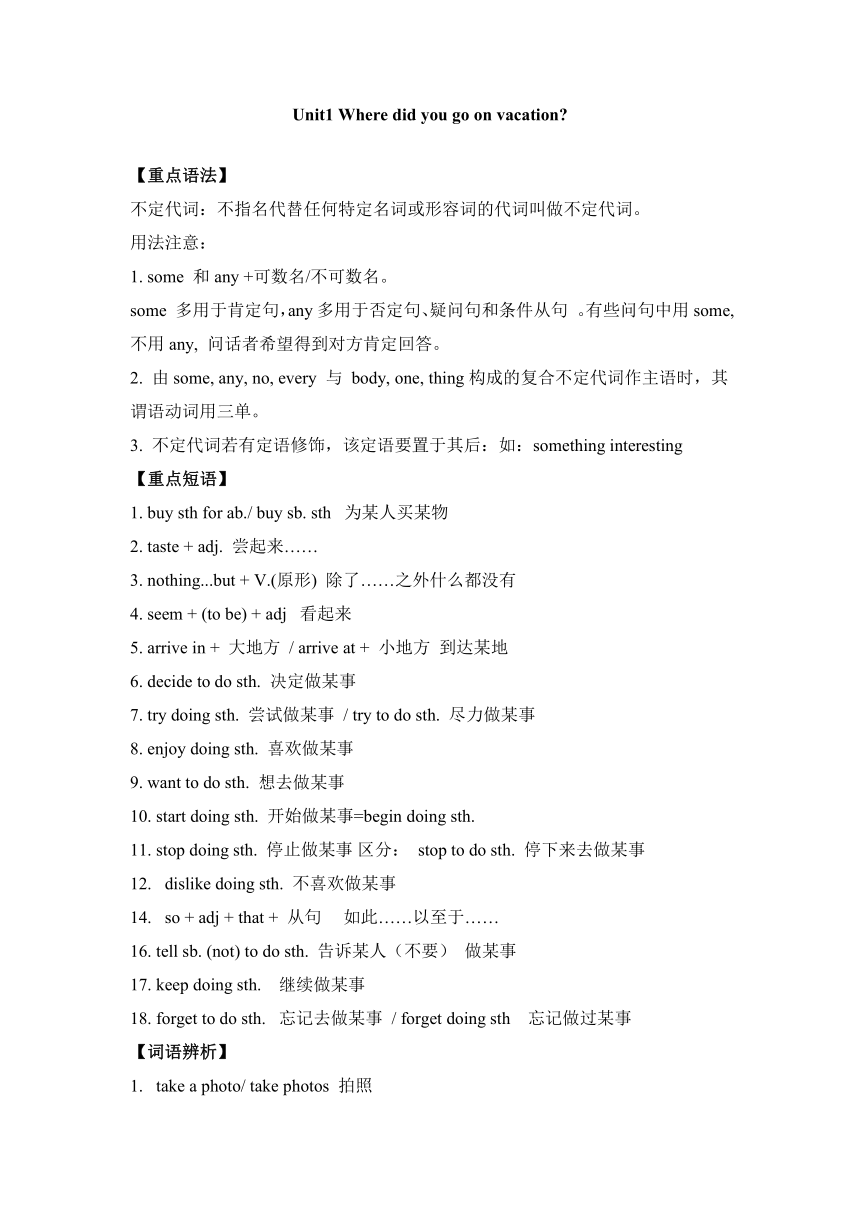
|
|
| 格式 | docx | ||
| 文件大小 | 24.3KB | ||
| 资源类型 | 教案 | ||
| 版本资源 | 人教新目标(Go for it)版 | ||
| 科目 | 英语 | ||
| 更新时间 | 2022-10-21 00:00:00 | ||
图片预览

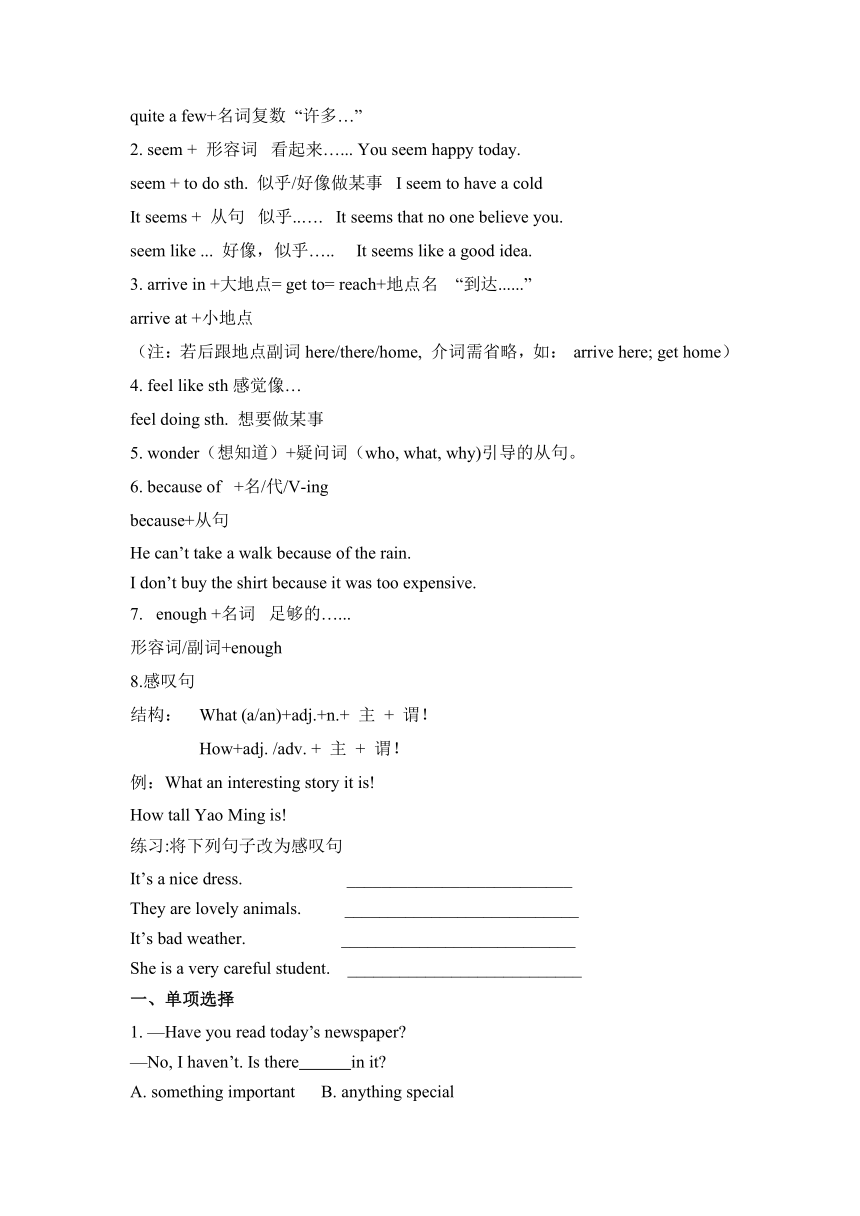
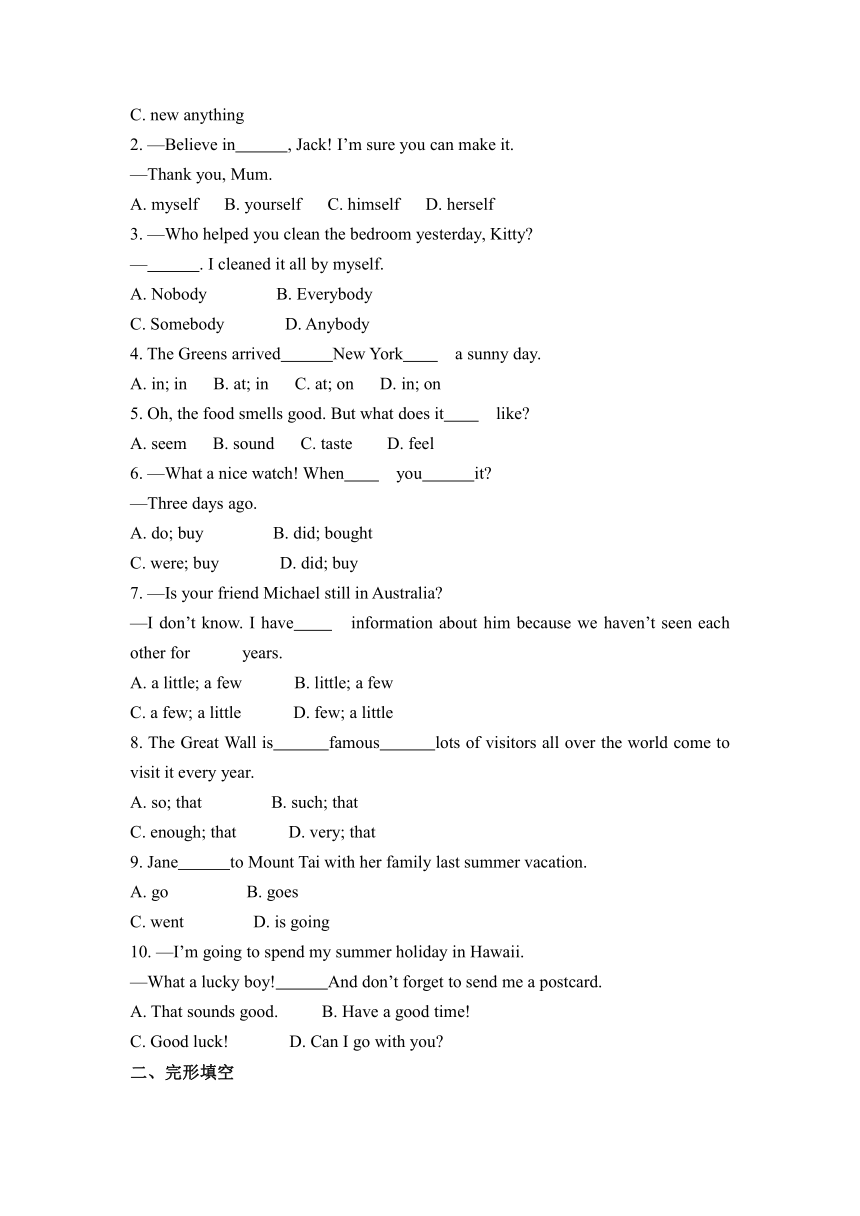
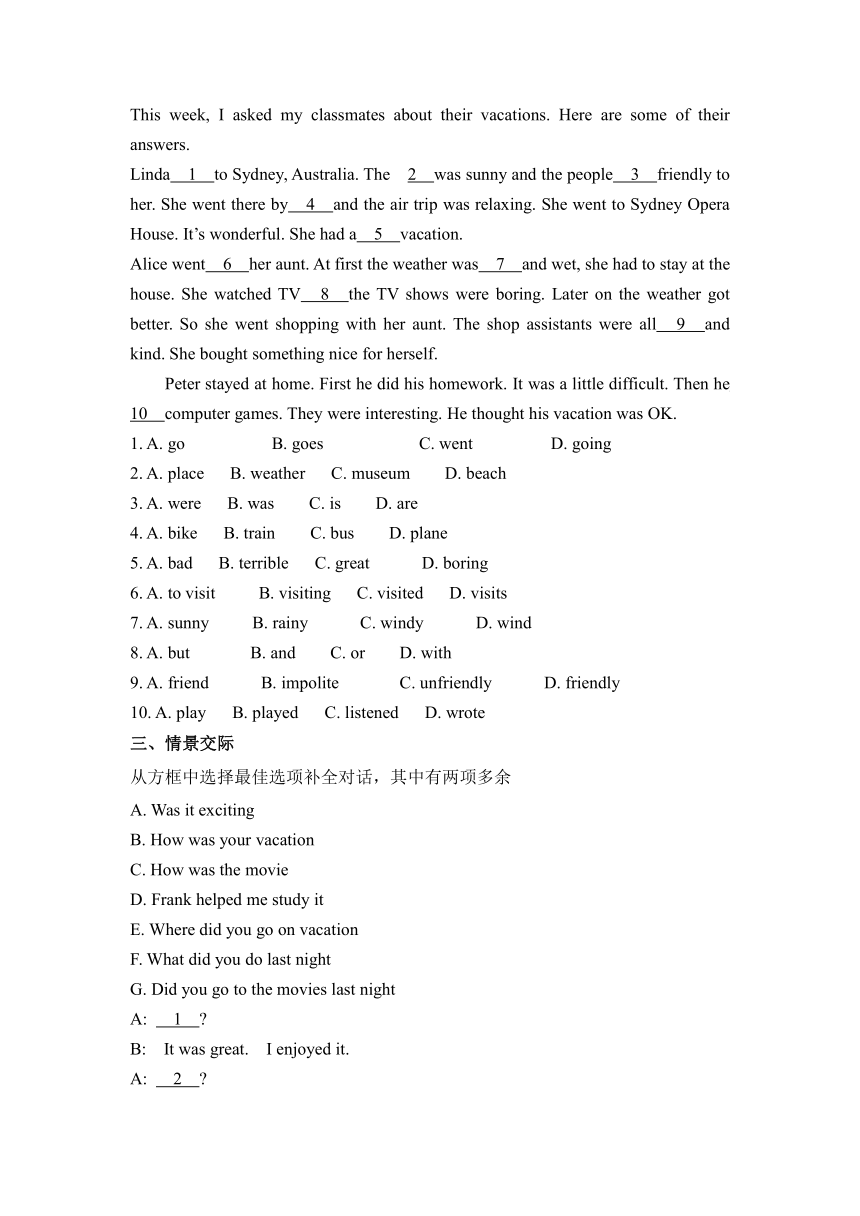
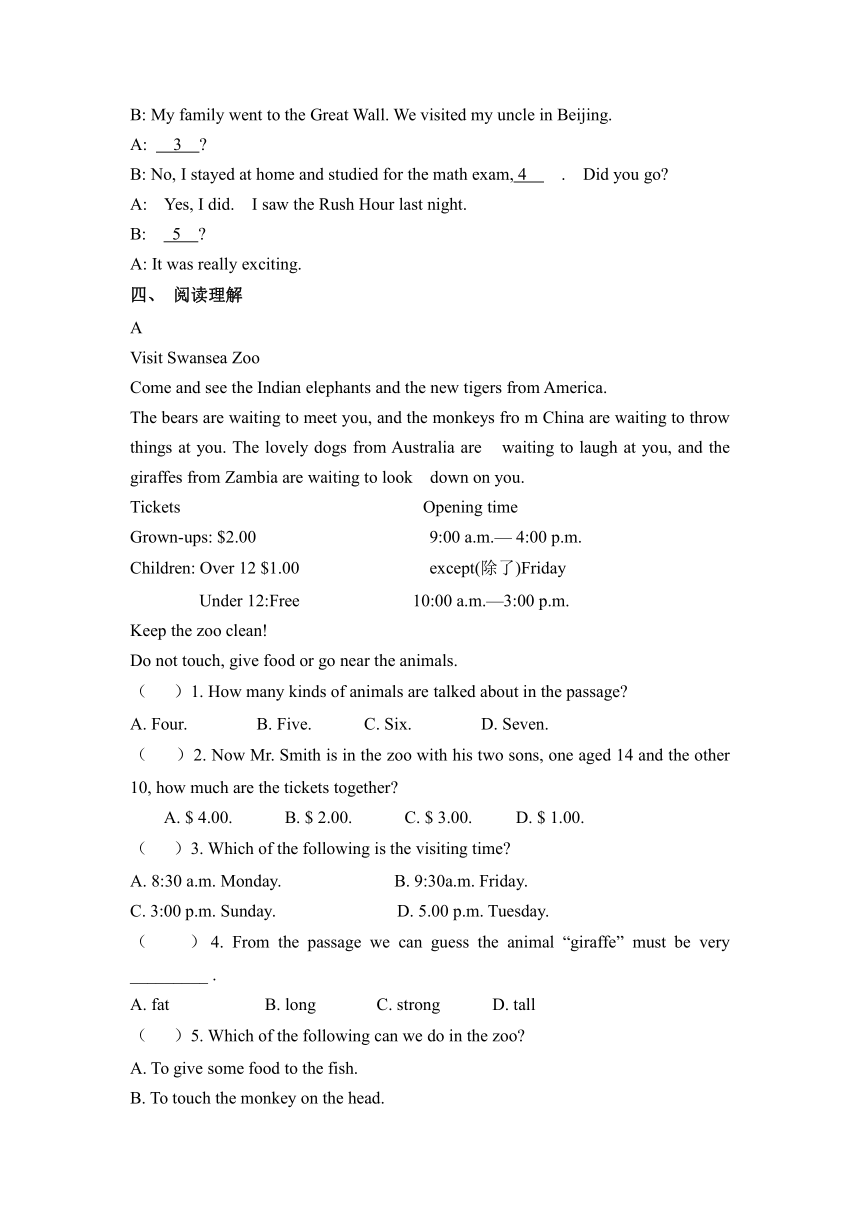
文档简介
Unit1 Where did you go on vacation
【重点语法】
不定代词:不指名代替任何特定名词或形容词的代词叫做不定代词。
用法注意:
1. some 和any +可数名/不可数名。
some 多用于肯定句,any多用于否定句、疑问句和条件从句 。有些问句中用some,不用any, 问话者希望得到对方肯定回答。
2. 由some, any, no, every 与 body, one, thing构成的复合不定代词作主语时,其谓语动词用三单。
3. 不定代词若有定语修饰,该定语要置于其后:如:something interesting
【重点短语】
1. buy sth for ab./ buy sb. sth 为某人买某物
2. taste + adj. 尝起来……
3. nothing...but + V.(原形) 除了……之外什么都没有
4. seem + (to be) + adj 看起来
5. arrive in + 大地方 / arrive at + 小地方 到达某地
6. decide to do sth. 决定做某事
7. try doing sth. 尝试做某事 / try to do sth. 尽力做某事
8. enjoy doing sth. 喜欢做某事
9. want to do sth. 想去做某事
10. start doing sth. 开始做某事=begin doing sth.
11. stop doing sth. 停止做某事 区分: stop to do sth. 停下来去做某事
12. dislike doing sth. 不喜欢做某事
14. so + adj + that + 从句 如此……以至于……
16. tell sb. (not) to do sth. 告诉某人(不要) 做某事
17. keep doing sth. 继续做某事
18. forget to do sth. 忘记去做某事 / forget doing sth 忘记做过某事
【词语辨析】
1. take a photo/ take photos 拍照
quite a few+名词复数 “许多…”
2. seem + 形容词 看起来…... You seem happy today.
seem + to do sth. 似乎/好像做某事 I seem to have a cold
It seems + 从句 似乎..…. It seems that no one believe you.
seem like ... 好像,似乎….. It seems like a good idea.
3. arrive in +大地点= get to= reach+地点名 “到达......”
arrive at +小地点
(注:若后跟地点副词here/there/home, 介词需省略,如: arrive here; get home)
4. feel like sth 感觉像…
feel doing sth. 想要做某事
5. wonder(想知道)+疑问词(who, what, why)引导的从句。
6. because of +名/代/V-ing
because+从句
He can’t take a walk because of the rain.
I don’t buy the shirt because it was too expensive.
7. enough +名词 足够的…...
形容词/副词+enough
8.感叹句
结构: What (a/an)+adj.+n.+ 主 + 谓!
How+adj. /adv. + 主 + 谓!
例:What an interesting story it is!
How tall Yao Ming is!
练习:将下列句子改为感叹句
It’s a nice dress. __________________________
They are lovely animals. ___________________________
It’s bad weather. ___________________________
She is a very careful student. ___________________________
一、单项选择
1. —Have you read today’s newspaper
—No, I haven’t. Is there in it
A. something important B. anything special
C. new anything
2. —Believe in , Jack! I’m sure you can make it.
—Thank you, Mum.
A. myself B. yourself C. himself D. herself
3. —Who helped you clean the bedroom yesterday, Kitty
— . I cleaned it all by myself.
A. Nobody B. Everybody
C. Somebody D. Anybody
4. The Greens arrived New York a sunny day.
A. in; in B. at; in C. at; on D. in; on
5. Oh, the food smells good. But what does it like
A. seem B. sound C. taste D. feel
6. —What a nice watch! When you it
—Three days ago.
A. do; buy B. did; bought
C. were; buy D. did; buy
7. —Is your friend Michael still in Australia
—I don’t know. I have information about him because we haven’t seen each other for years.
A. a little; a few B. little; a few
C. a few; a little D. few; a little
8. The Great Wall is famous lots of visitors all over the world come to visit it every year.
A. so; that B. such; that
C. enough; that D. very; that
9. Jane to Mount Tai with her family last summer vacation.
A. go B. goes
C. went D. is going
10. —I’m going to spend my summer holiday in Hawaii.
—What a lucky boy! And don’t forget to send me a postcard.
A. That sounds good. B. Have a good time!
C. Good luck! D. Can I go with you
二、完形填空
This week, I asked my classmates about their vacations. Here are some of their answers.
Linda 1 to Sydney, Australia. The 2 was sunny and the people 3 friendly to her. She went there by 4 and the air trip was relaxing. She went to Sydney Opera House. It’s wonderful. She had a 5 vacation.
Alice went 6 her aunt. At first the weather was 7 and wet, she had to stay at the house. She watched TV 8 the TV shows were boring. Later on the weather got better. So she went shopping with her aunt. The shop assistants were all 9 and kind. She bought something nice for herself.
Peter stayed at home. First he did his homework. It was a little difficult. Then he 10 computer games. They were interesting. He thought his vacation was OK.
1. A. go B. goes C. went D. going
2. A. place B. weather C. museum D. beach
3. A. were B. was C. is D. are
4. A. bike B. train C. bus D. plane
5. A. bad B. terrible C. great D. boring
6. A. to visit B. visiting C. visited D. visits
7. A. sunny B. rainy C. windy D. wind
8. A. but B. and C. or D. with
9. A. friend B. impolite C. unfriendly D. friendly
10. A. play B. played C. listened D. wrote
三、情景交际
从方框中选择最佳选项补全对话,其中有两项多余
A. Was it exciting
B. How was your vacation
C. How was the movie
D. Frank helped me study it
E. Where did you go on vacation
F. What did you do last night
G. Did you go to the movies last night
A: 1
B: It was great. I enjoyed it.
A: 2
B: My family went to the Great Wall. We visited my uncle in Beijing.
A: 3
B: No, I stayed at home and studied for the math exam, 4 . Did you go
A: Yes, I did. I saw the Rush Hour last night.
B: 5
A: It was really exciting.
四、 阅读理解
A
Visit Swansea Zoo
Come and see the Indian elephants and the new tigers from America.
The bears are waiting to meet you, and the monkeys fro m China are waiting to throw things at you. The lovely dogs from Australia are waiting to laugh at you, and the giraffes from Zambia are waiting to look down on you.
Tickets Opening time
Grown-ups: $2.00 9:00 a.m.— 4:00 p.m.
Children: Over 12 $1.00 except(除了)Friday
Under 12:Free 10:00 a.m.—3:00 p.m.
Keep the zoo clean!
Do not touch, give food or go near the animals.
( )1. How many kinds of animals are talked about in the passage
A. Four. B. Five. C. Six. D. Seven.
( )2. Now Mr. Smith is in the zoo with his two sons, one aged 14 and the other 10, how much are the tickets together
A. $ 4.00. B. $ 2.00. C. $ 3.00. D. $ 1.00.
( )3. Which of the following is the visiting time
A. 8:30 a.m. Monday. B. 9:30a.m. Friday.
C. 3:00 p.m. Sunday. D. 5.00 p.m. Tuesday.
( )4. From the passage we can guess the animal “giraffe” must be very _________ .
A. fat B. long C. strong D. tall
( )5. Which of the following can we do in the zoo
A. To give some food to the fish.
B. To touch the monkey on the head.
C. To throw things everywhere.
D. To take a few nice photos.
B
Our family went to the Yellow Stone National Park last summer vacation. Our son, Tom, wanted to see bears there. And what an experience(经历)it was!
When we got there, we put up our tent and went to explore(探险). As we returned, we heard our daughter Susie cry out. And then we saw a bear go into our camp.
Tom wanted his father to chase(追赶)him away. His father said, “No. It’s dangerous to chase a bear. And don’t let him chase you. ”Susie said, “What shall we do Maybe we should climb a tree. ”Tom said, “No. We have to get him out of there. He might go to sleep in our tent. ”“Maybe we could make him leave if we put some honey outside for him to eat. ”Susie suggested. Then I said, “How are you going to get the honey It’s in the tent. ”We watched the bear go into the tent and heard him upset(翻倒; 弄翻)everything inside. “It’s foolish for us to try to chase him away. ”said my husband, “Leave him alone and wait for him to come out. ”We waited, but the bear stayed inside. We had to sleep in the car that night.
( )6. Tom wanted to go to Yellow Stone National Park to see .
A. tigers B. wolves C. bears D. birds
( )7. Where did the family go on vacation last summer
A. They went to the Central Park.
B. They went to Yellow Stone National Park.
C. They went to a zoo.
D. They just stayed at home.
( )8. Who do you think saw the bear first
A. Susie. B. Tom.
C. The writer. D. The writer’s husband.
( )9. What did they do when they saw a bear go into their tent
A. They chased the bear away.
B. They stayed outside the tent and did nothing.
C. They climbed up a tree.
D. They put some honey outside for the bear to eat.
( )10. What did the bear do in the tent
A. He ate the honey.
B. He chased the people away.
C. He drank the beer.
D. He turned things upside down.
C
It was the last day of school. Peter was happy. He liked school, but he liked summer vacation better.
He was having a pool party. All his friends were coming. He could hardly(几乎不) wait. After school, he rushed home. He wanted the party to be just right. Mum made sandwiches. She also had a big jug of juice. "Peter, make sure your room is clean," she said. Peter nodded(点头). Soon the doorbell rang. "Let me answer it!" said Peter.
Alan and James were there. They were ready to swim. "Hi!" said Peter. "We are almost ready to e in." The two boys came in. They played a game until(直到) the other three came. Then they played in the pool.
The pool deck was hot. The water was cold. They had great fun playing in the water. Mum put food and drinks on the table. It was near the pool. She took photos for them. They had a good time.
( )11. Peter was having a .
A. picnic B. class C. birthday party D. pool party
( )12. How many friends came to the party
A. 6. B. 5. C. 4. D. 7.
( )13. What did they drink
A. Juice. B. Cola. C. Soda. D. Water.
( )14. What did Mum do during the party
A. She made sandwiches. B. She made a jug of juice.
C. She took photos for them. D. She cleaned their rooms.
( )15. What is the best title for this story
A. Peter's Friends. B. Peter's Home.
C. Peter's Pool. D. Peter's Party.
D
Do you live in a city Do you know how cities began Long long ago, the world had only a few thousand people. These people moved from one place to another. They moved over the land, hunting animals for food.
No one knows how or when these people learned about growing food. But when they did, their lives changed. They did not have to move houses any more.
They could stay in one place and grow it. People began to live near each other, so the first village grew. Many people came to work in the villages, and these villages became larger and larger.
Then people had machines, life in the villages changed again. People built factories. More and more people lived near the factories. So the villages grew into cities. Some of them grew very big.
Today, it's strange that some people are moving back to small villages. Can you tell me why
根据短文内容,完成下列小题。
16. How many people were there in the world long long ago (no more than 5 words)
17. What did the villages grow into after people built factories (no more than 5 words)
18. Why did people move from place to place long long ago (no more than 5 words)
19. Who knows when people learned about growing food (no more than 5 words)
20. Why are some people moving back to small villages
五、用所给动词的适当形式填空, 完成短文。
I 1 (go)to Paris with my parents on vacation. The weather was fine. We 2 (have)a sightseeing(观光)tour of the city and we also 3 (visit)some of the famous places like the Eiffel Tower. From Paris we traveled down to the south of France near Marseilles by boat. We 4 (stay)there for three days. There we had a lot of fun. We 5 (swim)in the sea and 6 (take)many photos. We also 7 (do)lots of sports on the beach. We 8 (go)back a week later by train. The people there 9 (be)friendly. The food 10 (be)delicious. So the trip was really great.
1. 2. 3.
4. 5. 6.
7. 8. 9.
10.
六、用括号中所给词的适当形式填空
1. There is no (different) between the two books.
2. Let’s do some (activity) today.
3. This is an old (build).
4. They (go) to Mountain Tai last Sunday.
5. I (buy) a new coat for sister last weekend.
6. Tom didn’t buy anything for (he) last night.
7. Everyone in my family (like) watching TV.
8. Do you keep a (diary)
9. We (take) three photos in our school yesterday.
10. Tom (read) an interesting book just now.
七、根据汉语意思补全句子
1. 你们假期去了哪里?
______ ______ you go on vacation
2. 上星期天气怎么样?又闷又热。
--- _______ _______ the weather last week ---It was hot and humid.
3. 他们去年参观了博物馆.
They _______ ________ last year.
4. 我想去暖和的地方度假。
I'd like to go on vacation.
5. 上周因为天气不好,他们没有举行运动会。
They didn't hold the sports meeting last week the bad weather.
6. 每次乘飞机时, 我感觉我就像一只鸟儿飞翔在天空。
I___________ ___________a bird flying in the sky every time when I take a plane.
7. 这是一座多么美丽的校园呀!
___________ ___________ ___________ ___________it is!
8. 我帮迷路的小孩找到了他的父亲.
I __________ the _________ child find his father
9. 最后大卫决定再尝试一次。
David finally___________ ___________ ___________it again.
10. 我希望有足够的钱为父母买一所大房子。
I hope to have_______ ______ ______ ______a big house my parents.
八、书面表达
北京(Beijing)是中国的首都(capital)。它有许多名胜古迹(interesting places), 如长城、故宫、天安门广场等。假如你是Kate, 你到北京旅游, 度过了一个愉快的暑假。请你给你的同学Mike发一封电子邮件, 介绍一下北京之旅。
要求: 1. 语言正确, 条理清晰, 书写规范;
2. 词数: 60~80个词。
【重点语法】
不定代词:不指名代替任何特定名词或形容词的代词叫做不定代词。
用法注意:
1. some 和any +可数名/不可数名。
some 多用于肯定句,any多用于否定句、疑问句和条件从句 。有些问句中用some,不用any, 问话者希望得到对方肯定回答。
2. 由some, any, no, every 与 body, one, thing构成的复合不定代词作主语时,其谓语动词用三单。
3. 不定代词若有定语修饰,该定语要置于其后:如:something interesting
【重点短语】
1. buy sth for ab./ buy sb. sth 为某人买某物
2. taste + adj. 尝起来……
3. nothing...but + V.(原形) 除了……之外什么都没有
4. seem + (to be) + adj 看起来
5. arrive in + 大地方 / arrive at + 小地方 到达某地
6. decide to do sth. 决定做某事
7. try doing sth. 尝试做某事 / try to do sth. 尽力做某事
8. enjoy doing sth. 喜欢做某事
9. want to do sth. 想去做某事
10. start doing sth. 开始做某事=begin doing sth.
11. stop doing sth. 停止做某事 区分: stop to do sth. 停下来去做某事
12. dislike doing sth. 不喜欢做某事
14. so + adj + that + 从句 如此……以至于……
16. tell sb. (not) to do sth. 告诉某人(不要) 做某事
17. keep doing sth. 继续做某事
18. forget to do sth. 忘记去做某事 / forget doing sth 忘记做过某事
【词语辨析】
1. take a photo/ take photos 拍照
quite a few+名词复数 “许多…”
2. seem + 形容词 看起来…... You seem happy today.
seem + to do sth. 似乎/好像做某事 I seem to have a cold
It seems + 从句 似乎..…. It seems that no one believe you.
seem like ... 好像,似乎….. It seems like a good idea.
3. arrive in +大地点= get to= reach+地点名 “到达......”
arrive at +小地点
(注:若后跟地点副词here/there/home, 介词需省略,如: arrive here; get home)
4. feel like sth 感觉像…
feel doing sth. 想要做某事
5. wonder(想知道)+疑问词(who, what, why)引导的从句。
6. because of +名/代/V-ing
because+从句
He can’t take a walk because of the rain.
I don’t buy the shirt because it was too expensive.
7. enough +名词 足够的…...
形容词/副词+enough
8.感叹句
结构: What (a/an)+adj.+n.+ 主 + 谓!
How+adj. /adv. + 主 + 谓!
例:What an interesting story it is!
How tall Yao Ming is!
练习:将下列句子改为感叹句
It’s a nice dress. __________________________
They are lovely animals. ___________________________
It’s bad weather. ___________________________
She is a very careful student. ___________________________
一、单项选择
1. —Have you read today’s newspaper
—No, I haven’t. Is there in it
A. something important B. anything special
C. new anything
2. —Believe in , Jack! I’m sure you can make it.
—Thank you, Mum.
A. myself B. yourself C. himself D. herself
3. —Who helped you clean the bedroom yesterday, Kitty
— . I cleaned it all by myself.
A. Nobody B. Everybody
C. Somebody D. Anybody
4. The Greens arrived New York a sunny day.
A. in; in B. at; in C. at; on D. in; on
5. Oh, the food smells good. But what does it like
A. seem B. sound C. taste D. feel
6. —What a nice watch! When you it
—Three days ago.
A. do; buy B. did; bought
C. were; buy D. did; buy
7. —Is your friend Michael still in Australia
—I don’t know. I have information about him because we haven’t seen each other for years.
A. a little; a few B. little; a few
C. a few; a little D. few; a little
8. The Great Wall is famous lots of visitors all over the world come to visit it every year.
A. so; that B. such; that
C. enough; that D. very; that
9. Jane to Mount Tai with her family last summer vacation.
A. go B. goes
C. went D. is going
10. —I’m going to spend my summer holiday in Hawaii.
—What a lucky boy! And don’t forget to send me a postcard.
A. That sounds good. B. Have a good time!
C. Good luck! D. Can I go with you
二、完形填空
This week, I asked my classmates about their vacations. Here are some of their answers.
Linda 1 to Sydney, Australia. The 2 was sunny and the people 3 friendly to her. She went there by 4 and the air trip was relaxing. She went to Sydney Opera House. It’s wonderful. She had a 5 vacation.
Alice went 6 her aunt. At first the weather was 7 and wet, she had to stay at the house. She watched TV 8 the TV shows were boring. Later on the weather got better. So she went shopping with her aunt. The shop assistants were all 9 and kind. She bought something nice for herself.
Peter stayed at home. First he did his homework. It was a little difficult. Then he 10 computer games. They were interesting. He thought his vacation was OK.
1. A. go B. goes C. went D. going
2. A. place B. weather C. museum D. beach
3. A. were B. was C. is D. are
4. A. bike B. train C. bus D. plane
5. A. bad B. terrible C. great D. boring
6. A. to visit B. visiting C. visited D. visits
7. A. sunny B. rainy C. windy D. wind
8. A. but B. and C. or D. with
9. A. friend B. impolite C. unfriendly D. friendly
10. A. play B. played C. listened D. wrote
三、情景交际
从方框中选择最佳选项补全对话,其中有两项多余
A. Was it exciting
B. How was your vacation
C. How was the movie
D. Frank helped me study it
E. Where did you go on vacation
F. What did you do last night
G. Did you go to the movies last night
A: 1
B: It was great. I enjoyed it.
A: 2
B: My family went to the Great Wall. We visited my uncle in Beijing.
A: 3
B: No, I stayed at home and studied for the math exam, 4 . Did you go
A: Yes, I did. I saw the Rush Hour last night.
B: 5
A: It was really exciting.
四、 阅读理解
A
Visit Swansea Zoo
Come and see the Indian elephants and the new tigers from America.
The bears are waiting to meet you, and the monkeys fro m China are waiting to throw things at you. The lovely dogs from Australia are waiting to laugh at you, and the giraffes from Zambia are waiting to look down on you.
Tickets Opening time
Grown-ups: $2.00 9:00 a.m.— 4:00 p.m.
Children: Over 12 $1.00 except(除了)Friday
Under 12:Free 10:00 a.m.—3:00 p.m.
Keep the zoo clean!
Do not touch, give food or go near the animals.
( )1. How many kinds of animals are talked about in the passage
A. Four. B. Five. C. Six. D. Seven.
( )2. Now Mr. Smith is in the zoo with his two sons, one aged 14 and the other 10, how much are the tickets together
A. $ 4.00. B. $ 2.00. C. $ 3.00. D. $ 1.00.
( )3. Which of the following is the visiting time
A. 8:30 a.m. Monday. B. 9:30a.m. Friday.
C. 3:00 p.m. Sunday. D. 5.00 p.m. Tuesday.
( )4. From the passage we can guess the animal “giraffe” must be very _________ .
A. fat B. long C. strong D. tall
( )5. Which of the following can we do in the zoo
A. To give some food to the fish.
B. To touch the monkey on the head.
C. To throw things everywhere.
D. To take a few nice photos.
B
Our family went to the Yellow Stone National Park last summer vacation. Our son, Tom, wanted to see bears there. And what an experience(经历)it was!
When we got there, we put up our tent and went to explore(探险). As we returned, we heard our daughter Susie cry out. And then we saw a bear go into our camp.
Tom wanted his father to chase(追赶)him away. His father said, “No. It’s dangerous to chase a bear. And don’t let him chase you. ”Susie said, “What shall we do Maybe we should climb a tree. ”Tom said, “No. We have to get him out of there. He might go to sleep in our tent. ”“Maybe we could make him leave if we put some honey outside for him to eat. ”Susie suggested. Then I said, “How are you going to get the honey It’s in the tent. ”We watched the bear go into the tent and heard him upset(翻倒; 弄翻)everything inside. “It’s foolish for us to try to chase him away. ”said my husband, “Leave him alone and wait for him to come out. ”We waited, but the bear stayed inside. We had to sleep in the car that night.
( )6. Tom wanted to go to Yellow Stone National Park to see .
A. tigers B. wolves C. bears D. birds
( )7. Where did the family go on vacation last summer
A. They went to the Central Park.
B. They went to Yellow Stone National Park.
C. They went to a zoo.
D. They just stayed at home.
( )8. Who do you think saw the bear first
A. Susie. B. Tom.
C. The writer. D. The writer’s husband.
( )9. What did they do when they saw a bear go into their tent
A. They chased the bear away.
B. They stayed outside the tent and did nothing.
C. They climbed up a tree.
D. They put some honey outside for the bear to eat.
( )10. What did the bear do in the tent
A. He ate the honey.
B. He chased the people away.
C. He drank the beer.
D. He turned things upside down.
C
It was the last day of school. Peter was happy. He liked school, but he liked summer vacation better.
He was having a pool party. All his friends were coming. He could hardly(几乎不) wait. After school, he rushed home. He wanted the party to be just right. Mum made sandwiches. She also had a big jug of juice. "Peter, make sure your room is clean," she said. Peter nodded(点头). Soon the doorbell rang. "Let me answer it!" said Peter.
Alan and James were there. They were ready to swim. "Hi!" said Peter. "We are almost ready to e in." The two boys came in. They played a game until(直到) the other three came. Then they played in the pool.
The pool deck was hot. The water was cold. They had great fun playing in the water. Mum put food and drinks on the table. It was near the pool. She took photos for them. They had a good time.
( )11. Peter was having a .
A. picnic B. class C. birthday party D. pool party
( )12. How many friends came to the party
A. 6. B. 5. C. 4. D. 7.
( )13. What did they drink
A. Juice. B. Cola. C. Soda. D. Water.
( )14. What did Mum do during the party
A. She made sandwiches. B. She made a jug of juice.
C. She took photos for them. D. She cleaned their rooms.
( )15. What is the best title for this story
A. Peter's Friends. B. Peter's Home.
C. Peter's Pool. D. Peter's Party.
D
Do you live in a city Do you know how cities began Long long ago, the world had only a few thousand people. These people moved from one place to another. They moved over the land, hunting animals for food.
No one knows how or when these people learned about growing food. But when they did, their lives changed. They did not have to move houses any more.
They could stay in one place and grow it. People began to live near each other, so the first village grew. Many people came to work in the villages, and these villages became larger and larger.
Then people had machines, life in the villages changed again. People built factories. More and more people lived near the factories. So the villages grew into cities. Some of them grew very big.
Today, it's strange that some people are moving back to small villages. Can you tell me why
根据短文内容,完成下列小题。
16. How many people were there in the world long long ago (no more than 5 words)
17. What did the villages grow into after people built factories (no more than 5 words)
18. Why did people move from place to place long long ago (no more than 5 words)
19. Who knows when people learned about growing food (no more than 5 words)
20. Why are some people moving back to small villages
五、用所给动词的适当形式填空, 完成短文。
I 1 (go)to Paris with my parents on vacation. The weather was fine. We 2 (have)a sightseeing(观光)tour of the city and we also 3 (visit)some of the famous places like the Eiffel Tower. From Paris we traveled down to the south of France near Marseilles by boat. We 4 (stay)there for three days. There we had a lot of fun. We 5 (swim)in the sea and 6 (take)many photos. We also 7 (do)lots of sports on the beach. We 8 (go)back a week later by train. The people there 9 (be)friendly. The food 10 (be)delicious. So the trip was really great.
1. 2. 3.
4. 5. 6.
7. 8. 9.
10.
六、用括号中所给词的适当形式填空
1. There is no (different) between the two books.
2. Let’s do some (activity) today.
3. This is an old (build).
4. They (go) to Mountain Tai last Sunday.
5. I (buy) a new coat for sister last weekend.
6. Tom didn’t buy anything for (he) last night.
7. Everyone in my family (like) watching TV.
8. Do you keep a (diary)
9. We (take) three photos in our school yesterday.
10. Tom (read) an interesting book just now.
七、根据汉语意思补全句子
1. 你们假期去了哪里?
______ ______ you go on vacation
2. 上星期天气怎么样?又闷又热。
--- _______ _______ the weather last week ---It was hot and humid.
3. 他们去年参观了博物馆.
They _______ ________ last year.
4. 我想去暖和的地方度假。
I'd like to go on vacation.
5. 上周因为天气不好,他们没有举行运动会。
They didn't hold the sports meeting last week the bad weather.
6. 每次乘飞机时, 我感觉我就像一只鸟儿飞翔在天空。
I___________ ___________a bird flying in the sky every time when I take a plane.
7. 这是一座多么美丽的校园呀!
___________ ___________ ___________ ___________it is!
8. 我帮迷路的小孩找到了他的父亲.
I __________ the _________ child find his father
9. 最后大卫决定再尝试一次。
David finally___________ ___________ ___________it again.
10. 我希望有足够的钱为父母买一所大房子。
I hope to have_______ ______ ______ ______a big house my parents.
八、书面表达
北京(Beijing)是中国的首都(capital)。它有许多名胜古迹(interesting places), 如长城、故宫、天安门广场等。假如你是Kate, 你到北京旅游, 度过了一个愉快的暑假。请你给你的同学Mike发一封电子邮件, 介绍一下北京之旅。
要求: 1. 语言正确, 条理清晰, 书写规范;
2. 词数: 60~80个词。
同课章节目录
- Unit 1 Where did you go on vacation?
- Section A
- Section B
- Unit 2 How often do you exercise?
- Section A
- Section B
- Unit 3 I'm more outgoing than my sister.
- Section A
- Section B
- Unit 4 What's the best movie theater?
- Section A
- Section B
- Unit 5 Do you want to watch a game show?
- Section A
- Section B
- Unit 6 I'm going to study computer science.
- Section A
- Section B
- Unit 7 Will people have robots?
- Section A
- Section B
- Unit 8 How do you make a banana milk shake?
- Section A
- Section B
- Unit 9 Can you come to my party?
- Section A
- Section B
- Unit 10 If you go to the party, you'll have a grea
- Section A
- Section B
